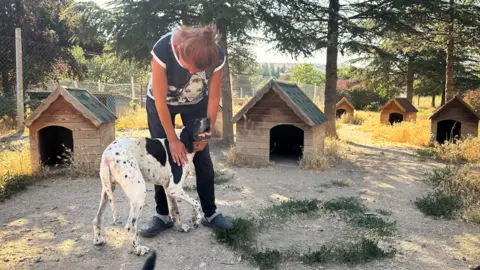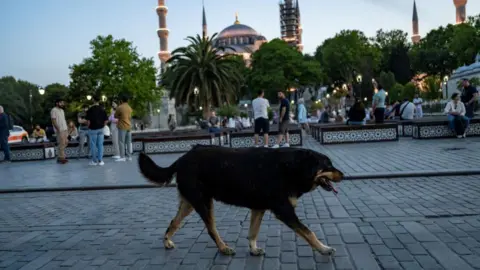[ad_1]
By Victoria Craig, BBC News, Ankara
 BBC
BBCUnder the shade of a leafy green apricot tree on a scorching summer afternoon, Gokcen Yildiz scoops up a squirming ball of light-brown fur.
It licks her all over the face and she breaks out in giggles.
But laughter gives way to a more serious tone as she points to the dog’s back legs, which are missing paws. A sign, she says, of the abuse some of Turkey’s street dogs are subjected to.
Ms Yildiz is a secondary school physics teacher by day, street-dog advocate by night. The canine she’s holding is one of 160 she’s collected on the property where she lives on the outskirts of Turkey’s capital city, Ankara.
Her dogs are a small fraction of the estimated four million that make up the country’s street-dog population.
It’s a problem that has fiercely divided public opinion: are stray dogs a neighbourhood fixture to be looked after and loved?
Or does the government need to take more drastic solutions, like those state media are reporting that it’s considering – including euthanasia?
On her 15,000 sq m property, Ms Yildiz looks after elderly and disabled dogs, and those with psychological or behavioural issues.
“It is not my job, but I look after dogs in need,” she said. “I always experience financial worry because the economy is getting harder. When the price of petrol increases, everything like pet food or the medicine I give, or the vet expenses – everything goes up.”

She said she feels anxious about finances, but her bigger concern is what will happen to the dogs if she doesn’t collect them.
“The dogs outside of here eat every two or three days, but they’re alive. They’re not about to die. That’s what really worries me,” she said.
Lawmakers from President Recep Tayyip Erdogan’s Justice and Development Party (AKP) are working on a new bill aimed at getting dogs off the streets.
It hasn’t yet been introduced into the country’s parliament, but state media report it could require municipalities to collect stray dogs, shelter them for around 30 days, and if the animals are not adopted in that time, euthanise them.
The latter provision has outraged animal rights activists – and Turkey’s dog lovers, like Ms Yildiz – but it’s also raised questions about whether existing facilities across the country could handle additional responsibilities.
Only about one third of the nation’s provincial and district municipalities have shelters, according to Doctor Murat Arslan, president of the Turkish Veterinary Medical Association.
 Getty Images
Getty ImagesHe said this had been one of the problems with an existing law, which requires dogs to be sterilised and then returned to the streets where they lived.
“In order to manage the animal population, street dogs needed to be collected, sterilised, given some vaccinations, and then released back to the street. However, not every municipality had shelters or facilities where these operations could be carried out. Especially in small municipalities, there are neither shelters nor sufficient employment of veterinarians.”
If this law, enacted 20 years ago, had been enforced, the street-dog population wouldn’t be so large today, Dr Arslan said.
Animal abandonment and overbreeding and selling of dogs had also allowed the street-dog population to rise, he told the BBC. Although animals are microchipped and registered in a centralised database, officials needed to be better at following through with fines for owners when animals were found to have been thrown out on the street, he added.
Regardless of what led to the problem, campaign groups like Safe Streets Association argue a solution is needed to take dogs permanently off the street.
 Getty Images
Getty ImagesAttorney Meltem Zorba is a volunteer for Safe Streets. She works with families that have been victims of stray-dog attacks, and points to government statistics that show over the past five years, street dogs have contributed to 55 deaths, more than 5,000 injuries, and 3,500 traffic accidents.
“We have been pressuring for legal change for three years,” she said. “There should not be stray dogs on the streets. These attacks on people causing death, traffic accidents, and other animals being attacked are unacceptable.”
She’s calling for a legal requirement to take dogs off the streets for good – rather than the catch-and-release protocol in place now. Ms Zorba also says the dogs pose other concerns including rabies and public health issues arising from dog faeces in public places, such as parks and playgrounds.
“This is rationality,” she said of the creation of new legislation, adding that euthanasia should be a last resort and a result of an animal being deemed too sick or posing a risk to society.
That’s where a national consensus seems to be building. A recent opinion poll showed nearly 80% of respondents supported measures to take dogs off the street and provide shelter. But less than 3% believed collected dogs should be euthanised.
Both Ms Zorba and Ms Yildiz support a government solution that would allow dogs to be taken off the streets, collected in newly-built shelters around the country, sterilised, and looked after through the end of their lives, if not adopted.
It’s believed that ministers plan to provide local authorities with fresh funds to implement any new law on stray dogs.
But it’s unclear whether the government – already dealing with an economic crisis that’s seen inflation climb to 75% this year – has the resources available for such a solution.
[ad_2]
Source link freeslots dinogame telegram营销




